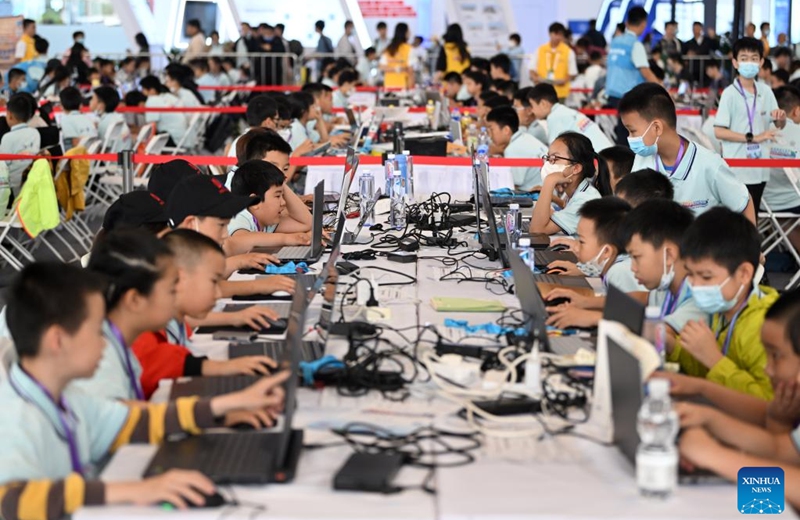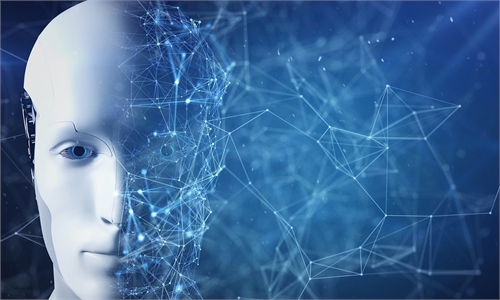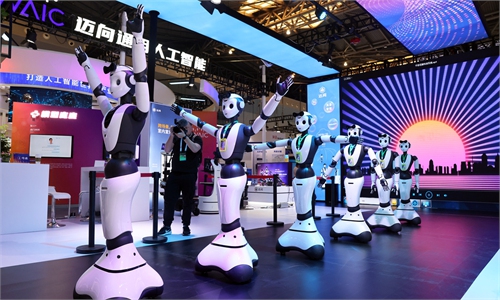Introducing AI courses as part of China's compulsory education syllabus a matter of time: observers

Participants prepare for a competition during the seventh World Intelligence Congress (WIC) in north China's Tianjin, May 20, 2023. The WIC, a major artificial intelligence (AI) event in China, kicked off on Thursday. Photo: Xinhua
One of the favorite classes for Cheng Ning (anonymity) is the weekly information technology class on which shegetsto experience painting and playing jigsaws with computers. This would be the first lessons to get the idea of artificial intelligence (AI) for the nine-year-old.
Cheng Ning, her classmates and peers from East China's Zhejiang Province were given more exposure to AI-related content as the province is one of the leading ones to explore integrating AI into classes of primary and middle schools in China. Now, Guangzhou, the capital city of South China's Guangdong became the latest province to do so.
The experiences of Zhejiang and Guangzhou in integrating AI into the education of young students are seen as pioneering solutions for how the country can nurture up-to-date AI talents. Concerns arise as a large number of entry-level jobs may be replaced by AI in the future, especially since the emergence of ChatGPT has created a stir, observers noted.
Pilot projects
According to a recent notice from theGuangzhou provincial education authorities, the AI course will be included in the annual curriculum plan of compulsory syllabus starting from this September. The total class hours for AI will be arranged together with practical activities, information technology and school-based courses.
Prior to taking in AI a part of the compulsory education across schools, Guangzhou has identified three districts, Tianhe district, Liwan district and Huangpu district, as the city's AI curriculum experimental areas and a total of 147 primary and secondary schools as the city's AI curriculum experimental schools.
"I regarded the practices from Guangzhou and Zhejiang as part of pilot projects for the AI courses to be part of our compulsory education across the country in the future. It will much likely happen within five or ten years," Li Zonghui, the vice president of the Institute of Cyber and Artificial Intelligence Rule of Law affiliated with the Nanjing University of Aeronautics and Astronautics, told the Global Times.
As early as 2017, the State Council issued the "New Generation of Artificial Intelligence Technology Development Plan," proposing to widely carry out AI science popularization activities, implement national intelligent education projects, set up AI-related courses in primary and secondary schools, and gradually promote programming education.
In recent years, many regions, including Wuhan in Hubei Province, Nanshan district in Shenzhen, Xiangtan in Hunan Province have also released educational implementation plans to promote AI in primary and secondary schools, media reports said.
The introduction of AI into the classroom today is similar to the popularization of computer in schools in the early 1980s, some voices said. Those children who were taught with computers have become the backbone of the internet era. Likewise, 20 years later as AI is popularized, they are able to engage in AI related work.
The specific plan for Guangzhou to introduce AI into classroom has yet been seen but Zhejiang's experience showed AI content in textbooks of students of the sixth grade of primary schooland of students of high schools have taken quite a large proportion, Zhejiang Daily reported.
Both junior and primary schools have content on understandingAI, speech recognition technology, speech synthesis technology, and AI ethics. In the high school information technology textbooks, there is also a chapter about neural network learning, a recent hot topic because of the ChatGPT.
Innovation above anything
The introduction of AI into classes is widely seen as an inevitable choice to cope with burgeoning development of the technology. However, will the move naturally nurture more competitive talents in the AI era and people who are not easily replaced by the cutting-edge technology?
Even with Cheng Ning who has started to learn Lego and robot programming extra-curricular classes since kindergarten, her parents found that the kind of course is more about imitating others, rather than about innovation cultivation.
There is dilemma about AI education, Xiong Bingqi, director of the 21st Century Education Research Institute in Beijing, told the Global Times.
He explained that if not including the AI as part of enrollment exams of high schools or colleges, the study won't be given enough measure as it should have but if do bring the AI into exams, it will fall into exam-oriented education which deviates from the initial purpose of nurturing innovative talent.
AI is a combination of multiple other subjects and the basic logic behind a powerful AI is the capability to innovate and calculate, which means it would make no sense to give young students tests, Li noted.
Either Zhejiang experience or Guangzhou experience, the essential should to nurture students' capability to learn new things and hopefully it will offer a better solution about nurturing AI talents, observers said.
Xiong suggested that the solution would not only add a basic course of AI in primary and secondary schools, but to reform the education mode of basic education, to get rid of the education mode that only attaches importance to "knowledge education," and to explore the scientific education mode of "cultivating students' comprehensive innovation."



